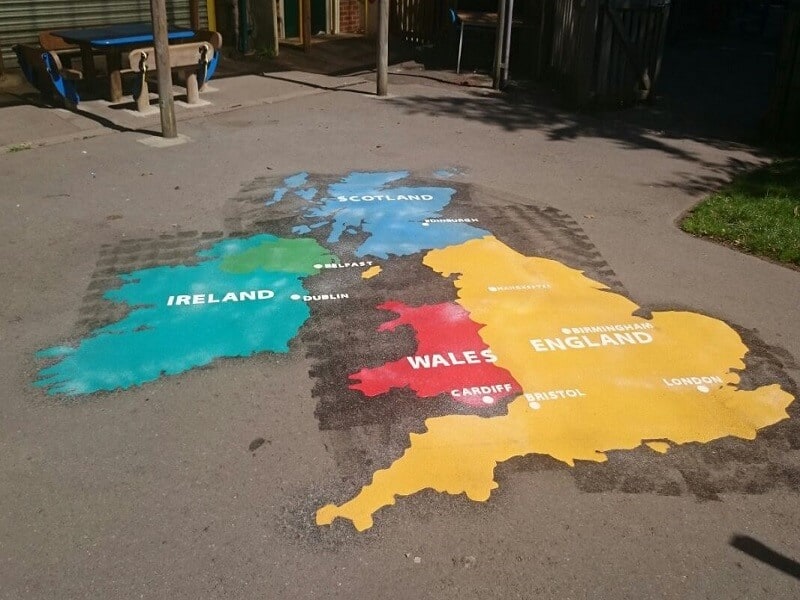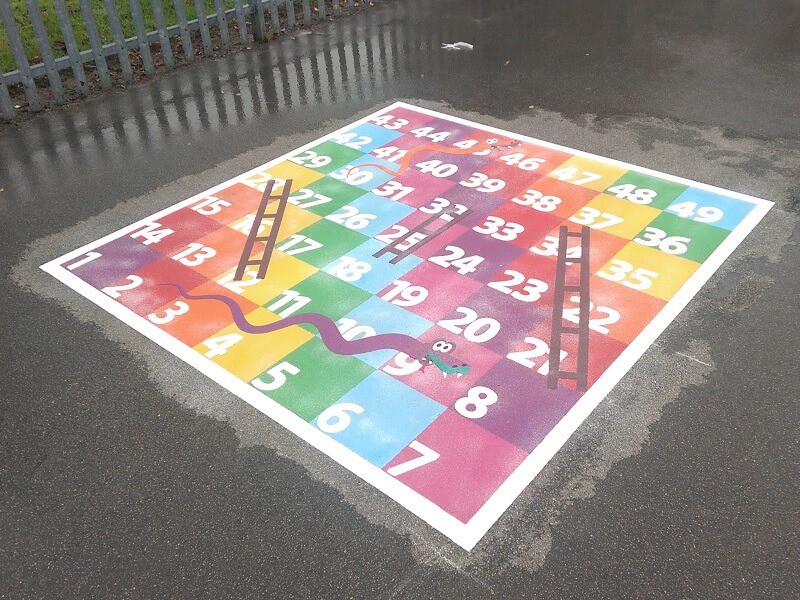20+ Years Experience
Specialist Playground Markings

Playgrounds are designated spaces equipped with various recreational structures and equipment specifically designed to facilitate play. They serve as an important environment for children to engage in unstructured play and develop essential social skills.
Child development is a multi-faceted process that encompasses physical, cognitive, emotional, and social aspects. Playgrounds contribute to all these areas of development, but their impact on social development is particularly remarkable.
By engaging in play activities within playgrounds, children have the opportunity to learn and practice important social skills that are vital for their personal and interpersonal growth.
Social skills, also referred to as social competence, encompass a range of abilities that enable individuals to interact effectively with others. These skills include communication, cooperation, empathy, and understanding.
Developing these skills from an early age is crucial as they lay the foundation for positive relationships and social well-being later in life.
Playgrounds play a significant role in fostering the development of social skills in children. Firstly, they provide opportunities for interaction among children of different ages, backgrounds, and abilities. This promotes inclusivity and allows children to learn how to initiate and maintain social connections.
Secondly, playgrounds encourage cooperation and collaboration as children engage in group play activities. They learn to take turns, share resources, and work together towards a common goal. These experiences teach important lessons about teamwork and develop skills such as negotiation and compromise.
Furthermore, playgrounds offer a platform for children to develop their communication skills. Whether it’s through verbal exchanges, non-verbal cues, or imaginative play, children learn to express themselves, listen to others, and interpret social signals effectively.
Lastly, playgrounds enhance empathy and understanding. Through play, children develop an awareness of others’ emotions and perspectives. They learn to consider the feelings and needs of their peers, thereby nurturing their ability to empathise and show compassion.
The benefits of developing social skills in playgrounds are vast. Children who engage in social play are more likely to build positive relationships, develop strong self-esteem, and exhibit better emotional regulation. They are more equipped to handle conflicts, resolve differences, and collaborate with others, all of which are essential life skills.
To maximize the social benefits of playgrounds, it is important to create an inclusive and supportive play environment.
Providing a range of play equipment that encourages collaboration and group play, promoting positive social norms, and fostering adult supervision that guides and facilitates social interactions can greatly enhance the social development of children within playground settings.
Playgrounds are outdoor spaces designed for children to play, explore, and socialise. They are crucial for children’s development as they provide opportunities to interact with peers, develop social skills, and foster creativity.
Playgrounds offer a safe environment for children to engage in physical activities, enhancing their physical fitness and coordination. They promote cognitive development through imaginative play and problem-solving.
The significance of playgrounds lies in their ability to cultivate social connections, encourage cooperation and teamwork, and teach children valuable life skills such as communication and conflict resolution.
Playgrounds play a crucial role in child development by contributing to various aspects of a child’s growth. This section will explore how playgrounds contribute to child development. It will discuss how playgrounds not only enhance physical abilities but also foster cognitive, emotional, and social growth.
Each subsection will delve into the specific ways playgrounds shape children, helping them become well-rounded individuals. So let’s delve into the diverse and significant impacts of playgrounds on child development.
Playgrounds play a crucial role in promoting physical development in children. They provide a safe and stimulating environment for children to engage in various physical activities that enhance their strength, coordination, and overall fitness.
Cognitive development is an essential aspect of a child’s growth, and playgrounds play a vital role in nurturing this development. Here are four ways in which playgrounds contribute to cognitive development:
By providing opportunities for exploration and stimulating environments, playgrounds promote cognitive development in children.
Emotional development is a crucial aspect of child development that involves understanding and managing emotions. Playgrounds play a significant role in fostering emotional development in children.
To maximize the emotional benefits of playgrounds, parents and caregivers can encourage open conversations about emotions and provide emotional support when needed.
Social development is a crucial aspect of a child’s growth, and playgrounds play a significant role in fostering this development. Here are some ways in which playgrounds contribute to social development:
By cultivating social interaction, cooperation, communication, and empathy, playgrounds help children develop essential social skills that are invaluable throughout their lives.
To maximise the social benefits of playgrounds, it’s important to encourage inclusive play, provide opportunities for group activities, and create a positive and supportive play environment.
Social skills are the abilities used to effectively interact and communicate with others. They are important because they enable the building and maintaining of relationships, collaboration, conflict resolution, and confident navigation of social situations.
When children develop strong social skills, they are more likely to have positive interactions with peers and adults, experience higher self-esteem, and succeed academically and professionally later in life.
Some key social skills include active listening, empathy, cooperation, and problem-solving. Playgrounds provide an ideal setting for children to practice and refine these skills through engaging in cooperative play, taking turns, sharing, and negotiating with others.
Playgrounds have a significant impact on children’s social skills and the formation of meaningful relationships. In this section, we will discuss how playgrounds contribute to the development of social skills.
We will explore how playgrounds offer opportunities for interaction, promote cooperation and collaboration, and help children navigate the complexities of social interactions. So, let’s delve into the transformative power of play in enhancing communication skills and nurturing empathy in young minds.
Opportunities for interaction are essential for children’s social development. Playgrounds provide a platform for children to engage with their peers, enhancing their social skills and fostering meaningful connections. Here is a list highlighting the benefits of opportunity for interaction at playgrounds:
By engaging in activities together, children learn how to share, take turns, and resolve conflicts, promoting positive social interactions.
Playgrounds offer a rich environment for children to practice and cultivate these necessary social skills. Ensuring access to well-designed playgrounds can significantly contribute to the overall social development of children.
Cooperation and collaboration are essential skills that children develop while playing in playgrounds. This section will discuss how playgrounds encourage these skills.
To maximise the social benefits of playgrounds, parents and caregivers can encourage group activities, organise cooperative games, and promote inclusive play. These opportunities will further enhance children’s cooperation and collaboration skills, leading to healthier social interactions and relationships.
Developing communication skills is a vital aspect of a child’s development and can be nurtured through playground activities.
By incorporating these steps, playgrounds can effectively cultivate communication skills in children, helping them develop strong interpersonal abilities that will benefit them throughout their lives.
Enhancing empathy and understanding is a crucial aspect of child development that can be nurtured in playgrounds. Here are a few ways in which playgrounds help promote empathy and understanding:
To maximise the social benefits of playgrounds, it is essential to create an inclusive and supportive environment, provide guidance on appropriate behaviour, and encourage positive interactions between children.
By doing so, playgrounds can play a significant role in nurturing empathy and understanding among children, which are important skills for their future relationships and interactions.
Developing social skills in playgrounds offers numerous benefits for children’s overall development and well-being.
To maximise the social benefits of playgrounds, here are some strategies you can consider:
Unstructured play on playgrounds provides children with a group setting where they can practice and observe social interactions. This helps them develop important social skills such as empathy, cooperation, and friendship.
Sedentary activities like watching TV can replace unstructured play and limit children’s opportunities for socialising. This can lead to a lack of social skills development, making it harder for children to effectively communicate and build relationships.
Inclusive play environments cater to children with special needs and provide opportunities for children of different ages and personalities to play together. This promotes new experiences, learning opportunities, and the development of social skills such as empathy and cooperation.
Play on playgrounds offers children the chance to learn a range of social skills, from basic introductions and conflict resolution to understanding boundaries and practicing communication skills in group settings.
Unstructured outdoor play allows children to observe and explore the world, contributing to their intellectual development. It offers learning experiences, stimulates curiosity, and helps them develop cognitive skills through hands-on exploration and problem-solving.
Playground playtime provides opportunities for children to learn about emotional processes and improve their interpersonal skills. By observing others and engaging in social play, children can develop emotional intelligence and learn how to express themselves effectively.








We Aim To Reply To All Enquiries With-in 24-Hours